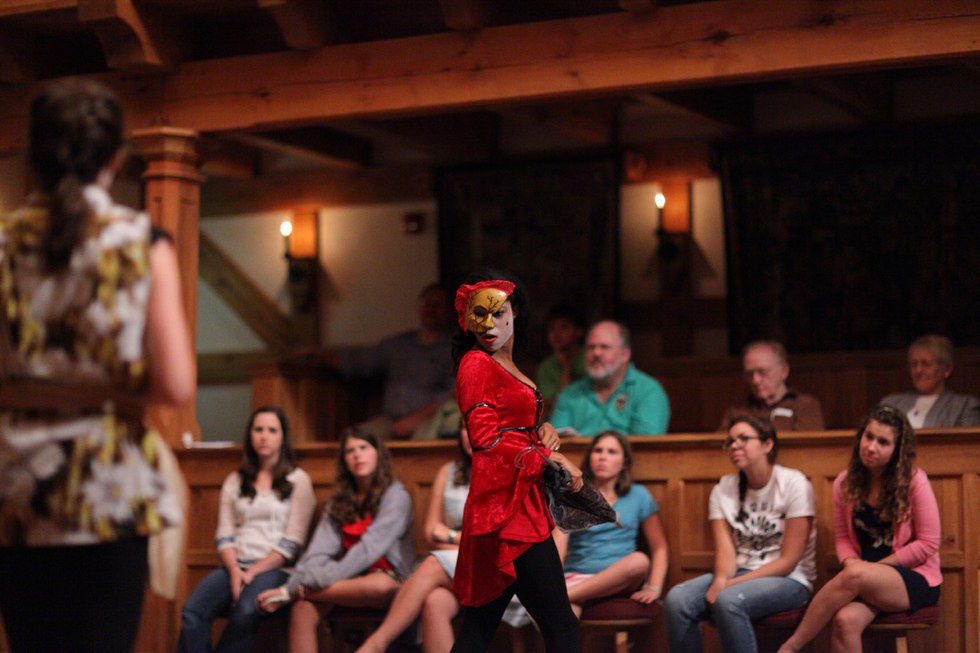A young Will Smith, in solidarity, once told '90s kids that parents (and adults in general) "don't understand" them. Why don't they?
As a barely functioning burgeoning 25-year-old, I have made these mistakes when regarding people younger than myself. Be it through social media or when out and about at Target, I used to see teens, their thumbs glued to their iPhone 6s, and roll my eyes. Who did they need to text, Oscar the Grouch? I'd grumble under my breath. Why weren't they paying attention to where they were going? I'd think as I ran into a door. Why did they take necessities--food, water, roofs over their heads--for granted?! I'd internally shout as I drive back home to get some lunch. Ungrateful, that's what they were. I didn't hesitate to underestimate them.
Then, about a month ago, I started my administrative internship at a Shakespeare-intensive theater summer camp for 13-18-year-old kids and teens. Though I didn't have constant contact with them, I was able to observe their daily rehearsals, warm-ups and their performances in hour-long productions of "Henry the Sixth," "Part Two" and "A Midsummer Night's Dream." I was able to watch them play theater games without fear of ridicule. I saw them enthusiastically engage with Shakespeare's text without hesitation. I saw them embody such famous characters as King Henry the Sixth, Bottom the Weaver, Titania, Jack Cade, Puck, Eleanor the Duchess of Gloucester (nee Cobham) and Queen Margaret of Anjou.I watched their eyes glint with sympathy as they watched the last act of "King Lear." I saw them form friendships, camaraderie, and respectful relationships with the people around them, peer and adult alike. I learned much more about kids and teens than I thought I would. I then understood why I didn't think of kids and teens as anything other, and why adults don't.
We don't take them seriously.
I know, I know. Duh, right? We don't take them seriously because we're not supposed to, right? They're just kids. They're just teens. We shouldn't take them seriously. You've probably gotten to do your baby-talk impression within the past month. "Oh, you're getting SO BIG! I could just eat you up!" you say. "But you're just a baby! How do you know about black-and-white films?" you exclaim.
Well, there's that word again: just. Kids are people too. Teens--young adults, teenagers, adolescents, what have you--are people too. They have thoughts, feelings, emotions, like any adult. They have these feelings about global and local goings-on, about their family, about their friends, about their job goals, about their college choices, about all sorts of things, again, like any adult. At some point we do address this fact--that they have feelings--but because kids don't share our life experiences, aren't as tall and probably don't know who William Shatner is, we don't take this belief to heart.
Therein lies the misstep. We believe that they can't be engaged in serious, topical conversations. They don't know what it's like to have a mortgage, a job, relationships and everything that go into them. Well, have you talked with them about those things? You might shirk off what kids and teens have to say about the current job market, the election or other current events. It's not worth the effort, you say. They don't know anything. Well, have you asked them? Have you addressed them like an equal?
In a world that is constantly changing, constantly charged with 24-hour coverage of hateful quasi-politicians, racial injustice, economic flows and everything in between, why don't we expect kids, teens and young adults to notice?
Yes, kids and teens still have a lot to learn at their ages. They have time. They have you to help them along the way. All they want you to do is to address them as a person.

























